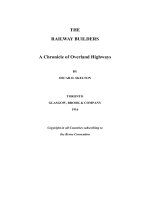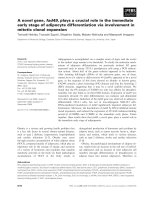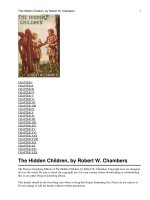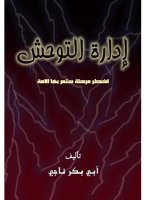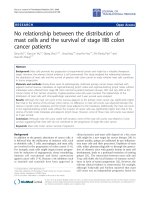Oxford bookworms the railway children stage 3
Bạn đang xem bản rút gọn của tài liệu. Xem và tải ngay bản đầy đủ của tài liệu tại đây (1.4 MB, 149 trang )
THE RAILWAY CHILDREN
The change in their lives comes very suddenly. One
minute they are all a happy family, with everything that
they want. The next minute, Father has to go away -
‘on business’, Mother says. But her face is white, and
the children know that it’s bad news. They have to
leave their nice home in London, and go and live in a
little house in the country. They are poor now, Mother
says. She tries to sound happy, but her eyes are sad and
worried.
Roberta, Peter, and Phyllis also worry about Father,
but no one can be sad all the time. A new life is
beginning, with adventures around every corner. And
there, down the hill from their new house, is the
railway, with its shining lines leading all the way back
to London; and the black mouth of the tunnel, where
trains come screaming out of the darkness like great
wild animals . . .
O X F O R D BO O K W O R M S
L I B R A RY
Human Interest
The Railway Children
Stage 3 (1000 headwords)
Series Editor: Jennifer Bassett
Founder Editor: Tricia Hedge
Activities Editors: Jennifer Bassett and
Christine Lindop
The Railway Children
Retold by
John
Escott
Illustrate
d by
Rachel
Birkett
O X FOR D U N I V E R S IT Y PR E S S
Oxford University Press
Great Clarendon Street, Oxford 0X2 6DP
Oxford New York
Athens Auckland Bangkok Bogota Buenos Aires
Cape Town
Chennai Dar es Salaam Delhi Florence Hong Kong
Istanbul Karachi Kolkata
Kuala Lumpur Madrid Melbourne Mexico City
Mumbai Nairobi
Paris Sao PauJo Shanghai Singapore Taipei Tokyo
Toronto Warsaw
with associated companies in
Berlin Ibadan
OXFORD and OXFORD ENGLISH
are trade marks of Oxford University Press
ISBN 0 19 423013 9
This simplified edition © Oxford University Press
2000
Fourth impression 2001
First published in Oxford Bookworms 1993
This second edition published in the Oxford
Bookworms Library 2000
A complete recording of this Bookworms edition of
The Railway Children
is available on cassette ISBN 0 19 422784 7
N o unauthorized photocopying
All rights reserved. No part of this publication may
be reproduced, stored in a
retrieval system, or transmitted, in any form or by
any means, electronic,
mechanical, photocopying, recording, or otherwise,
without the
prior written permission of Oxford University Press.
This book is sold subject to the condition that it shall
not,
by way of trade or otherwise, be lent, resold, hired
out or otherwise
circulated without the publisher’s prior consent in
any form
of binding or cover other than that in which it is
published
and without a similar condition including this
condition
being imposed on the subsequent purchaser.
Typeset by Wyvern Typesetting Ltd, Bristol
Printed in Spain
CONTENTS
The beginning of things
They were not railway children at the beginning. They
lived with their father and mother in London. There
were
three of them. Roberta - she was always called Bobbie,
and
was the oldest. Next came Peter, who wanted to be an
engineer when he grew up. And the youngest was
Phyllis,
who was always trying to be good.
Mother was almost always at home, ready to play
with
the children, or to read to them. And she wrote stories,
then
read them to the children after tea.
These three lucky children had everything that they
needed. Pretty clothes, a warm house, and lots of toys.
They also had a wonderful father who was never angry,
and always ready to play a game.
There were three of them - Bobbie, Peter, and Phyllis.
happy until their life in London was over, and they had
to
live a very different life indeed.
The awful change came suddenly.
* * *
It was Peter’s birthday, and he was ten years old.
Among
his presents was a toy steam engine, and it quickly
became
Peter’s favourite toy. But after three days, the engine
went
BANG! Peter was very unhappy about his broken toy.
The
others said he cried, but Peter said his eyes were red
because
he had a cold.
When Father came home that day, Peter told him the
sad
story about his engine, and Father looked at it very
carefully. Mother and the children waited.
Father looked at the toy steam engine very carefully.
‘Of course there’s hope!’ said Father, smiling. ‘I’ll
mend
it on Saturday, and you can all help me.’
Just then, someone knocked at the front door. A few
moments later, Ruth - the maid - came in. ‘There are
two
gentlemen to see you,’ she said to Father.
‘Now, who can they be?’ said Father.
‘Try to be quick, dear,’ said his wife. ‘It’s nearly time
for
the children to go to bed.’
But the two men stayed and stayed. Father’s voice
got
louder and louder in the next room, but the children
and
Mother could not hear what was said. Then Ruth came
back and spoke to Mother.
‘He wants you to go in, ma’am,’ she said. ‘I think
he’s
had bad news. Be ready for the worst.’
Mother went into the next room, and there was more
talking. Soon after, the children heard Ruth call a taxi,
then
there was the sound of feet going outside and down the
steps.
Mother came back, and her face was white.
‘It’s time to go to bed,’ she said to the children.
‘Ruth will
take you upstairs.’
‘But, Father—’ began Phyllis.
‘Father’s had to go away on business,’ said Mother.
‘Now, go to bed, darlings.’
Bobbie whispered, ‘It wasn’t bad news, was it?’
‘No, darling,’ said Mother. ‘I can’t tell you anything
tonight. Please go now.’
* si- *
Mother went out early the next morning, and it was
nearly
seven o’clock before she came home. She looked ill and
tired, and the children asked her no questions.
Mother drank a cup of tea, then she said, ‘Now, my
darlings, I want to tell you something. Those men did
bring
bad news last night. Father will be away for some time,
and
I’m very worried.’
‘Is it something to do with the Government?’ asked
Bobbie. The children knew that Father worked in a
Government office.
‘Yes,’ said Mother. ‘Now don’t ask me any more
questions
about it. Will you promise me that?’
The children promised.
Everything was horrible for some weeks. Mother was
nearly always out. Ruth, the maid, went away. Then
Mother went to bed for two days, and the children
wondered
if the world was coming to an end.
One morning, Mother came down to breakfast. Her
face
was very white, but she tried to smile.
‘We have to leave our house in London,’ she said.
‘We’re
going to live in the country, in a dear little white house
near
a railway line. I know you’ll love it.’
A busy week followed, packing everything up in
boxes.
The children almost enjoyed the excitement.
‘We can’t take everything,’ Mother told them. ‘Just the
necessary things. We have to play “being poor” for a
while.’
On their last night in the house, Peter had to sleep on
the
floor, which he enjoyed very much. ‘I like moving,’ he
said.
‘I don’t!’ said Mother, laughing.
Bobbie saw her face when she turned away. ‘Oh,
Mother,’
she thought. ‘How brave you are! How I love you!’
Next day, they went to the railway station, and got on
a
train. At first, they enjoyed looking out of the windows,
but
then they became sleepy. Later, Mother woke them.
‘Wake up, dears,’ she said. ‘We’re there.’
There were no taxis, and a man with a cart took their
boxes. The children and Mother walked behind the cart
A man with a cart took their boxes.
fields. After a while, a shape appeared in the darkness.
‘There’s the house,’ said Mother.
The cart went along by the garden wall, and round to
the
back door. There were no lights in any of the windows.
‘Where’s Mrs Viney?’ said Mother.
‘Who’s she?’ asked Bobbie.
‘A woman from the village. I asked her to clean the
place
and make our supper,’ said Mother.
‘Your train was late,’ said the man with the cart.
‘She’s
probably gone home.’
‘But she has the key,’ said Mother.
‘It’ll be under the doorstep,’ said the man. He went
to
look. ‘Yes, here it is.’
They went inside the dark house. There was a large
kitchen with a stone floor, but there was no fire, and
the
room was cold. There was a candle on the table, and
the
man lit it. Then a noise seemed to come from inside
the
There was a candle on the table, and the man lit it.
walls of the house. It sounded like small animals
running
up and down. Then the cart man went away and shut
the
door. Immediately, the candle went out.
‘Oh, I wish we hadn’t come!’ said Phyllis.
a
Peter and the coal
‘You’ve often wanted something to happen,’ said
Mother,
lighting the candle again. ‘And now it has. This is an
adventure, isn’t it? I told Mrs Viney to leave our
supper
ready. I suppose she’s put it in the other room. Let’s go
and
see.’
They looked in the other room, but found no supper.
‘What a horrible woman!’ said Mother. ‘She’s taken
the
money, but got us nothing to eat at all!’
‘Then we can’t have any supper,’ said Phyllis,
unhappily.
‘Yes, we can,’ said Mother. ‘We can unpack one of
the
boxes. There’s some food from the old house.’
They found candles in the box, and the girls lit them.
Then Bobbie fetched coal and wood, and lit a fire. It
was a
strange supper - tomatoes, potato chips, dried fruit and
cake. And they drank water out of tea-cups. After
supper,
they put sheets and blankets on the beds, then Mother
went
to her own room.
Very early next morning, Bobbie pulled Phyllis’s hair to
wake her. ‘Wake up!’ she said. ‘We’re in the new
house,
don’t you remember?’
They wanted to surprise their mother and get the
breakfast
ready, but first they went to look outside. The house
seemed to stand in a field near the top of a hill, and
they
could see a long way.
‘This place is much prettier than our house in
London,’
said Phyllis.
They saw the railway line at the bottom of the hill,
and
the big black opening of a tunnel. Further away, they
could
see a high bridge between the hills, but the station was
too
far away to see.
‘Let’s go and look at the railway,’ said Peter.
‘Perhaps
there are trains passing.’
‘We can see them from here,’ said Bobbie.
So they sat down on a big, flat, comfortable stone in
the
grass. And when Mother came to look for them at eight
o’clock, they were asleep in the sun.
‘I’ve found another room,’ Mother told them. ‘The
door
is in the kitchen. Last night, we thought it was a
cupboard.’
There was a table in the little square room, and on the
table was their supper.
‘There’s a letter from Mrs Viney,’ explained Mother.
‘Her son broke his arm and she went home early. She’s
coming again later this morning.’
‘Cold meat and apple pie for breakfast!’ laughed
Peter.
‘How funny!’
But their supper made a wonderful breakfast.
All day, they helped Mother to unpack and arrange
everything in the rooms. It was late in the afternoon
When Mother came to look for them, they were asleep
in the sun.
